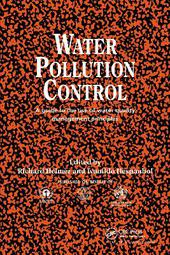
|
Water Pollution Control: A Guide to the Use of Water Quality Management Principles
Paperback / softback
Main Details
| Title |
Water Pollution Control: A Guide to the Use of Water Quality Management Principles
|
| Authors and Contributors |
By (author) Richard Helmer
|
|
By (author) Ivanildo Hespanhol
|
| Physical Properties |
| Format:Paperback / softback | | Pages:526 | | Dimensions(mm): Height 235,Width 159 |
|
| Category/Genre | Management of land and natural resources
Pollution and threats to the environment |
|---|
| ISBN/Barcode |
9780419229100
|
| Classifications | Dewey:628.168 |
|---|
| Audience | | Undergraduate | | Postgraduate, Research & Scholarly | | Professional & Vocational | |
|---|
|
Publishing Details |
| Publisher |
Taylor & Francis Ltd
|
| Imprint |
Spon Press
|
| Publication Date |
2 October 1997 |
| Publication Country |
United Kingdom
|
Description
High quality fresh water is limited in quantity and there is a need for comprehensive water management involving representatives of all those who use water. Effective management must ensure that the best use is make of available supplies, including protection from pollution, and to limit conflicts over access to fresh water. This calls for the establishment of clearly defined policies and strategies as well as for the development of enforceable mechanisms and tools for water pollution control. This handbook has been prepared by leading international experts participating in a Working Group coordinated by the World Health Organization and directed by individuals from UNEP, UNCHS, FAO and WHO and WSSCC addressing specific aspects of water resources management and water pollution control. A series of case studies from various regions have also been included, highlighting successful models of wastewater management and pollution control from different parts of the world. Water Pollution Control provides guiding principles for effective water quality management, addressing in particular: Identification, categorization and prioritization of local water quality and pollution control problems; development and implementation of policy, planning and coordination schemes, preparation and, or adaptation of legislation, monitroing programees, enforcement activities, training and information dissemination; management tools and instruments such as regulations, water quality standards, monitoring systems, water quality modelling tools and impact assessments; long term strategies for water pollution control based upon realistic short term goals. This is a handbook for policy makers and environmental managers in water authorities and engineering companies engaged in water quality programmes, especially in developing countries. It is also suitable for use as a textbook or as training material for water quality management courses.
Author Biography
Richard Helmer and Ivanildo Hespanhol both work for the World Health Organization.
|